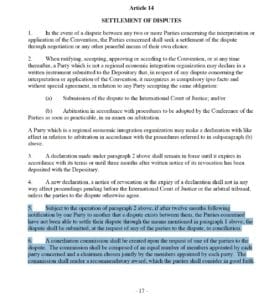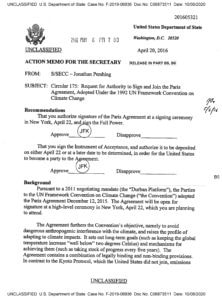Paris Climate ‘Accord’ FOIA Case: State Dept. Releases, Withholds Parts of Memo to Sec. John Kerry Requesting Authority to Sign Paris Agreement
It appears possible that, come January, the United States will rejoin the 2015 Paris climate agreement, committing to adopt the “Green New Deal” agenda (now rebranded for political purposes as “Net Zero”). This will not be accomplished by Senate ratification, but by the ‘pen and a phone’ approach first used by President Obama to claim U.S. “ratification” of what is on its face and by its history a treaty, requiring approval instead by a two-thirds Senate vote.
A document released last week by the State Department, in Freedom of Information Act litigation by the transparency group Energy Policy Advocates, includes a reminder of one consequence of this for America, should it occur: claiming to “re-join” the Paris climate treaty will immediately subject U.S. energy policy — and thereby economic and to some extent trade policy — to a UN “climate conciliation commission”.

Already, as the United Kingdom has shown, developed nations’ courts can be expected to cite the Paris climate treaty in blocking infrastructure development. The UK’s Court of Appeal ruled earlier this year that Heathrow Airport cannot be expanded because that would violate the UK’s ‘net zero’ commitment under Paris.
Then, Canada offered a reminder how progressive politicians will raise taxes in the name of complying with Paris: In Ottawa, “The parliamentary budget officer says the federal carbon tax would have to rise over the coming years if the country is to meet emission-reduction targets under the Paris climate accord.”
Now we are reminded that the U.S. can also expect a forum for antagonistic nations to bring their complaints about U.S. policy and claims of non-compliance with Paris’s required “Net Zero” agenda for resolution.
This might be one of the reasons that avoiding a Senate vote on Paris was a key objective of the Obama administration, which stated in August 2015 before there ever was even Paris text, that it would not be a “treaty”. This was the lesson learned from the U.S. Senate’s refusal to consider the 1997 Kyoto treaty: If the Senate votes on it, its details would be debated, and defeated.
That objective of an end-run around the U.S. Constitution’s process was shared by European nations: the French climate change ambassador to the U.N. and President of the Paris COP, Laurence Tubiana and Laurent Fabius, respectively, both openly admitted.
Yet, those same countries treated Paris as a treaty for their own ratification purposes. This cavalier approach to the Constitution in the Obama years makes it easy to forget the U.S. supposedly has the more stringent system for joining international entanglements.
Instead, the Obama team showed what one Senate Foreign Relations Committee lawyer decried as a “disturbing contempt for the Senate’s constitutional rights and responsibilities” by circumventing its constitutional treaty role on Paris. Unfortunately, the institution shrunk from a constitutional fight, and all parties spoke as if calling Paris an “accord” instead carried weight — though the the Kyoto Protocol was alternately called the “Kyoto Accord” and, yes, was still a treaty.
This brings us to the newly released (in part) memo — “Request for Authority to Sign and Join the Paris Agreement, Adopted under the 1992 UN Framework Convention on Climate Change” [UNFCCC] — reaffirming that Paris is the result of “a 2011 negotiating mandate (the “Durban Platform”)”. The Durban “mandate” was to “adopt…a protocol, another legal instrument or an agreed outcome with legal force at the twenty-first session of the Conference of the Parties and for it to come into effect and be implemented from 2020”.

That of course is Paris, the crushing provisions of which are found in Article 4, emission reduction promises. Art. 4.3 requires that the U.S. revisit and tighten its reduction promises every five years. That would cleverly make this the climate treaty…sorry, “accord”…to end all climate treaties. It commits the U.S. to ever greater “climate” policy restrictions, every five years, in perpetuity.
Pull this off and there will never be the threat again of facing the tyranny of the Constitution’s requirement of popular approval.
Political rhetoric aside, nothing in Paris’s terms says this provision is legally binding, but no that one over there isn’t. Instead, Paris was merely sold to and promoted by much of the press with the claim that Paris contains “a mix of legally binding and not legally binding provisions”.
As we have seen already in the UK/Heathrow Airport case, that did not last, as it was not intended to. Lawyers and courts have already begun to see to something of which Americans should be reminded, including that you can have promises of massive infrastructure spending, or you can have the Paris climate pact, but you can’t have them both.
And it won’t just be courts. Recall, first, that the Paris agreement as originally circulated contained a climate tribunal, or court. This was dropped after being noticed outside of polite circles. Nonetheless, the recently released if still heavily redacted memo reminds us that U.S. compliance with the legally binding here but maybe not over there Paris obligations is subject to the terms of that 1992 agreement, ratified by the U.S. Senate on the condition that it was and remained non-binding (again, stated nowhere in its terms).
UNFCCC declares, in Art. 14, “Settlement of Dispute”, that:
“5. …if after twelve months following notification by one Party to another that a dispute exists between them, the Parties concerned have not been able to settle their dispute through the means mentioned in paragraph 1 above, the dispute shall be submitted, at the request of any of the parties to the dispute, to conciliation.
6. A conciliation commission shall be created upon the request of one of the parties to the
dispute. The commission shall be composed of an equal number of members appointed by each party concerned and a chairman chosen jointly by the members appointed by each party. The commission shall render a recommendatory award, which the parties shall consider in good faith.”
This language governs U.S. compliance with the Paris climate “accord”. It is not open to dispute that any U.S. president who claims to “re-join” the Paris climate treaty will subject US energy policy — and thereby the U.S. economy — to a UN climate “conciliation commission”.
Paris requires and mandates the U.S. to revisit and tighten “Green New Deal”-style policies every five years. This is among the many reasons why the Paris climate agreement is a treaty, and also why it never would have been ratified. However, very soon, Americans may nonetheless be subject to its long-envisioned climate court.


